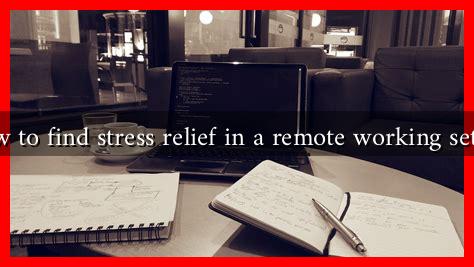-
Table of Contents
How to Find Stress Relief in a Remote Working Setup
As remote work becomes increasingly common, many individuals are grappling with the unique stressors that come with it. While the flexibility of working from home can be a boon, it can also lead to feelings of isolation, burnout, and anxiety. Understanding how to effectively manage stress in a remote working environment is crucial for maintaining both mental health and productivity. This article explores various strategies for finding stress relief while working remotely.
The Unique Stressors of Remote Work
Remote work presents a distinct set of challenges that can contribute to stress. According to a survey by Buffer, 20% of remote workers cite loneliness as their biggest struggle, while 18% struggle with collaboration and communication. Other common stressors include:
- Blurred boundaries between work and personal life
- Increased distractions at home
- Feelings of isolation from colleagues
- Uncertainty about job security
Recognizing these stressors is the first step toward finding effective relief strategies.
Creating a Dedicated Workspace
One of the most effective ways to manage stress in a remote working setup is to create a dedicated workspace. This helps establish a clear boundary between work and personal life. Here are some tips for setting up your workspace:
- Choose a quiet area in your home that is free from distractions.
- Invest in ergonomic furniture to promote comfort and reduce physical strain.
- Personalize your workspace with items that inspire you, such as plants or artwork.
By having a designated workspace, you can mentally separate work from leisure, which can significantly reduce stress levels.
Establishing a Routine
Establishing a daily routine can provide structure and predictability, which are essential for managing stress. A well-defined routine can help you stay focused and organized. Consider the following elements when creating your routine:
- Set specific work hours and stick to them.
- Incorporate regular breaks to recharge your mind.
- Schedule time for physical activity, which is known to reduce stress.
According to a study published in the Journal of Occupational Health Psychology, employees who maintain a structured routine report lower levels of stress and higher job satisfaction.
Utilizing Technology Wisely
While technology can be a source of stress, it can also be a powerful tool for relief. Here are some ways to use technology to your advantage:
- Use productivity apps like Trello or Asana to manage tasks and deadlines.
- Engage in virtual social activities with colleagues through platforms like Zoom or Microsoft Teams.
- Incorporate mindfulness apps such as Headspace or Calm to practice meditation and relaxation techniques.
By leveraging technology effectively, you can enhance your productivity while also finding moments of calm throughout your workday.
Prioritizing Mental Health
Taking care of your mental health is paramount when working remotely. Here are some strategies to prioritize your well-being:
- Practice mindfulness and meditation to reduce anxiety.
- Engage in regular physical activity, which has been shown to improve mood.
- Seek professional help if feelings of stress become overwhelming.
According to the American Psychological Association, regular exercise can reduce stress levels by releasing endorphins, which are natural mood lifters.
Conclusion
Finding stress relief in a remote working setup is not only possible but essential for maintaining productivity and mental well-being. By creating a dedicated workspace, establishing a routine, utilizing technology wisely, and prioritizing mental health, remote workers can effectively manage stress. Remember, it’s important to recognize the unique challenges of remote work and take proactive steps to address them. By implementing these strategies, you can create a healthier, more balanced work environment that fosters both personal and professional growth.
For more insights on managing stress in remote work, consider visiting the American Psychological Association.

